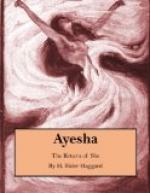Yes, he kissed the trembling horror of that wrinkled head, and I think it was one of the greatest, bravest acts ever done by man.
“Thou hast chosen,” said Atene in a cold voice, “and I tell thee, Leo Vincey, that the manner of thy choice makes me mourn my loss the more. Take now thy—thy bride and let me hence.”
But Ayesha still said no word and made no sign, till presently she sank upon her bony knees and began to pray aloud. These were the words of her prayer, as I heard them, though the exact Power to which it was addressed is not very easy to determine, as I never discovered who or what it was that she worshipped in her heart—“O Thou minister of the almighty Will, thou sharp sword in the hand of Doom, thou inevitable Law that art named Nature; thou who wast crowned as Isis of the Egyptians, but art the goddess of all climes and ages; thou that leadest the man to the maid, and layest the infant on his mother’s breast, that bringest our dust to its kindred dust, that givest life to death, and into the dark of death breathest the light of life again; thou who causest the abundant earth to bear, whose smile is Spring, whose laugh is the ripple of the sea, whose noontide rest is drowsy Summer, and whose sleep is Winter’s night, hear thou the supplication of thy chosen child and minister:
“Of old thou gavest me thine own strength with deathless days, and beauty above every daughter of this Star. But I sinned against thee sore, and for my sin I paid in endless centuries of solitude, in the vileness that makes me loathsome to my lover’s eyes, and for its diadem of perfect power sets upon my brow this crown of naked mockery. Yet in thy breath, the swift essence that brought me light, that brought me gloom, thou didst vow to me that I who cannot die should once more pluck the lost flower of my immortal loveliness from this foul slime of shame.
“Therefore, merciful Mother that bore me, to thee I make my prayer. Oh, let his true love atone my sin; or, if it may not be, then give me death, the last and most blessed of thy boons!”
CHAPTER XVI
THE CHANGE
She ceased, and there was a long, long silence. Leo and I looked at each other in dismay. We had hoped against hope that this beautiful and piteous prayer, addressed apparently to the great, dumb spirit of Nature, would be answered. That meant a miracle, but what of it? The prolongation of the life of Ayesha was a miracle, though it is true that some humble reptiles are said to live as long as she had done.
The transference of her spirit from the Caves of Kor to this temple was a miracle, that is, to our western minds, though the dwellers in these parts of Central Asia would not hold it so. That she should re-appear with the same hideous body was a miracle. But was it the same body? Was it not the body of the last Hesea? One very ancient woman is much like another, and eighteen years of the working of the soul or identity within might well wear away their trivial differences and give to the borrowed form some resemblance to that which it had left.




